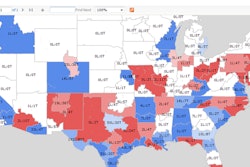Calling for a transition to “a long-term, stable funding source” for the nation’s transportation infrastructure, an Oregon congressman has introduced legislation also aimed at a short-term fix for declining highway dollars: a 15 cents per gallon increase in the federal motor fuels tax.
“The gas tax hasn’t been increased since the beginning of the Clinton administration,” said Rep. Earl Blumenauer, a Democrat. “Today, with inflation and increased fuel efficiency for vehicles, the average motorist is paying about half as much per mile as they did in 1993. It’s time for Congress to act. There’s a broad and persuasive coalition that stands ready to support Congress, including the U.S. Chamber of Commerce, National AFL-CIO, the construction and trucking industry, cyclists, professional groups, numerous associations of small and medium businesses, local governments, and transit agencies. We just need to give them something to support.”
 U.S. Rep. Earl Blumenauer, D-Ore.
U.S. Rep. Earl Blumenauer, D-Ore.The UPDATE Act of 2013 turns the recommendations of the Simpson-Bowles report, the National Surface Transportation Policy and Revenue Commission and the National Surface Transportation Financing Commission into proposed law.
Specifically, the bill would establish a Road Usage Fee Pilot Program to study mileage-based fee systems. Separately, HR 3636 amends the tax code to implement the increase to the current fuel tax.
The legislation phases in the tax increase starting in 2014, indexes the tax to inflation, and then confirms Congress’s intention to replace the gas tax with a more equitable, stable source of funding by 2024, according to Blumenauer.
Related: Congress told trucks need to pay more to fund roads
Leaders of American Trucking Associations commended Blumenauer for addressing the “woefully underfunded” transportation system.
“Underinvestment in highways is an enormous burden on the trucking industry, raising the cost of moving freight and undermining the reliability of a logistics system that is critical to our nation’s competitiveness,” said ATA President and CEO Bill Graves. “The additional investment in highway projects made possible by this new revenue will significantly improve the safety, reliability and efficiency of the trucking industry, to the benefit of all Americans.”
ATA has long called for a fuel tax increase, arguing that alternatives such as tolling the interstates are inefficient and unfair.
“Our support for raising the fuel tax should clearly demonstrate just how critical good roads are for moving freight, commuters, vacationers and shoppers,” said Mary Phillips, ATA senior vice president of legislative affairs. “If the users tell Congress ‘we support paying more to support our roads,’ we hope Congress will listen.”
In recent years, Congress has added to the General Fund deficit by transferring over $50 billion of General Fund revenue to the Highway Trust Fund in order to keep it afloat. In order to maintain current funding in the following years, the Highway Trust Fund will need almost $15 billion a year in addition to current gas tax receipts. Continuing down the current path will mean a 30 percent drop in federal transportation spending by 2024. The UPDATE Act would raise around $170 billion over ten years, Blumenauer says.
Related: Speakers stress urgent need for stable, increased highway funding
“This proposal provides the kind of long-term funding solutions that virtually every commission, including Simpson-Bowles, has said are needed to repair and upgrade our aging transportation network,” said Stephen E. Sandherr, CEO, Associated General Contractors of America. “What the congressman understands is that simply talking about the need to find new sources of revenue won’t help until we actually identify, support and enact them.”










